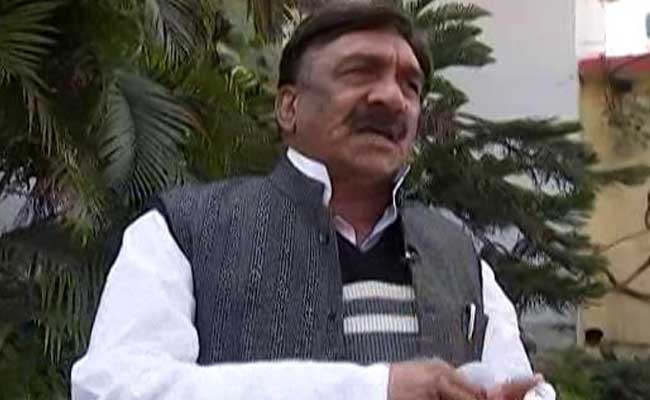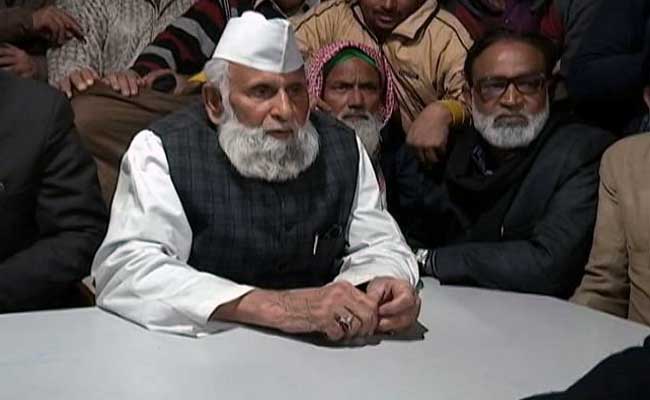A 4-time Lok Sabha member, Shafiqur Rehman Barq began his career with the Samajwadi Party.
Quick Take
Summary is AI generated, newsroom reviewed.
Asaduddin Owaisi's AIMIM contests 40 seats in UP
Won no seats in Bihar in 2015
In Sambhal, has appropriated famous 86-year-old Barq Sahib
For the first time, the party is contesting 40 seats in Uttar Pradesh - in the last state election five years ago, it did not participate. The quantum leap reflects Asaduddin Owaisi's ambition to turn his outfit into a national party with power extending far beyond its traditional reach of Telangana.
Shafiqur Rehman Barq is not the candidate from Sambhal, where Muslims form more than 65 per cent of the population. But for decades, he has been the area's undisputed political overlord, representing it both in parliament and in the state legislature. A four-time Lok Sabha member, he began his career with the Samajwadi Party: "I was there when Mulayam Singh laid its foundation." In the 2009 general elections, he left Mulayam Singh, who did not choose him as a candidate, and successfully ran for parliament from Mayawati's Bahujan Samaj Party. In 2014, he switched back, but lost his bid by just 5,000 votes. "I was betrayed by my own party," he says, alleging that a political rival, Iqbal Mehmood, worked to ensure his defeat.

UP Elections: Iqbal Mehmood is Samajwadi Party's candidate and the incumbent legislator of Sambhal.
On Wednesday, when Uttar Pradesh decides 63 seats, he will run against Iqbal Mehmood, who is Mulayam Singh's candidate and the incumbent legislator.
In 2014, the AIMIM, in its first foray outside Telengana, won two assembly seats in Maharashtra, a windfall for a small party. This success spurred Asaduddin Owaisi's ambition to form a pan-Indian party representing Muslims. But the hype was considerably dampened by the AIMIM's poor showing in Bihar in 2015, where it failed to win a single seat.
It has never contested the UP elections earlier. Its best chance lies in Sambhal and in the support of Shafiqur Rehman Barq.

Shafiqur Rehman Barq has represented Sambhal both in parliament and state legislature
This old rivalry literally partitions Sambhal in two. A shopkeeper near the historic Jama Masjid likened this to the divide between India and Pakistan. Mohallas or neighbourhoods have marked preferences between the two. This makes for a volatile political culture, where election time drives people into frenetic activity, with political processions spilling onto the streets late into the night and groups gathering at home to discuss each day's developments.
"But people are tired of these two men, their rivalry. One is a Nawab (an aristocrat) who is facing anti-incumbency, the other is on a ticket from a party that is Hyderabadi," asserts the Muslim candidate from Mayawati's party, Rafatullah, known locally as Neta Chedi. Sambhal has about 40,000 Dalits, predominantly Jatavs, who are Mayawati's main support group; he's hoping that the Dalit-Muslim combine that she has stressed in her campaign will see him through. Mayawati's rallies in Western UP close to its dates of polling have helped the BSP gain traction.
But in the endless identity arithmetic of Sambhal, Rafatalluah further points to a further subset, and claims that his community of Bovne Turks will vote for him, and not Shafiqur Rehman Barq, who is a Khoje Turk. Turk Muslims, who claim their descent from Mahmood Ghaznavi, are the largest of Sambhal's Muslim community, and are divided into two distinct groups - Khoje and Bovne (the former are the larger group in Sambhal).
This battle between three Muslim candidates, and the possibility of their fractioning the vote among them, has given the BJP the rare hope of winning a Muslim-dominated seat. Its candidate, Arvind Gupta, is a respected and gentle doctor, who is hoping that his personal rapport with the small town will win a portion of the Muslim vote. "It's true Muslims do not vote for the BJP, but my family and I have a good equation with Muslim families. They are my patients and I am sure they will look beyond the party and vote for me," he said.
Sajan Goel, who owns a Mentha factory, Sambhal's only real industry, says that Dr Gupta is the best bet for Sambhal. "We used to vote the Samajwadi Party into power, but there's been little development since Sambhal became a district. Muslims should unite with us. Forget the party and remember Dr Arvind is a good man," he urged.
This is at best a faint hope. Dr Arvind is simply from the wrong party. At a political meeting, this one within the zenana (women's quarters) - purdah is very strictly observed by the Turk Muslims-Shahana tells us "Dr Arvind is a good man, we like him, but how can we vote for him when his party goes after Muslims? BJP leaders talk of putting us under curfew. We will vote for Barq Sahibas has always spoken in the interest of Muslims," she said.
The fact of multiple Muslim candidates vying to emerge as the protector of the community is typical of the Muslim constituencies of this region and Shafiqur Rehman Barq is a past master at this game. People still remember his walkout from the parliament in 2013 to protest the singing of Vande Mataram, a patriotic song described as non-secular by leaders like him and Owaisi said. Even in Chaman Sarai, a locality which is a Samajwadi stronghold, a meat shop owner says, "Barqsahib is the one to raise Muslim issues in parliament. At a time when gaurakshaks (cow vigilantes) are going after us, he is the best option."
The AIMIM is riding on voices like these. For Barq, a charged election campaign strengthens his appeal as the combative leader of the Muslims against the perceived threat of the Hindu right. Owaisi's own radical rhetoric attracted a large crowd at a rally last week in the heart of Sambal.
But similar large crowds in Bihar did not translate into votes, and the Samajwadi countered with an impressive Akhilesh Yadav rally just three days later.
Track Latest News Live on NDTV.com and get news updates from India and around the world

